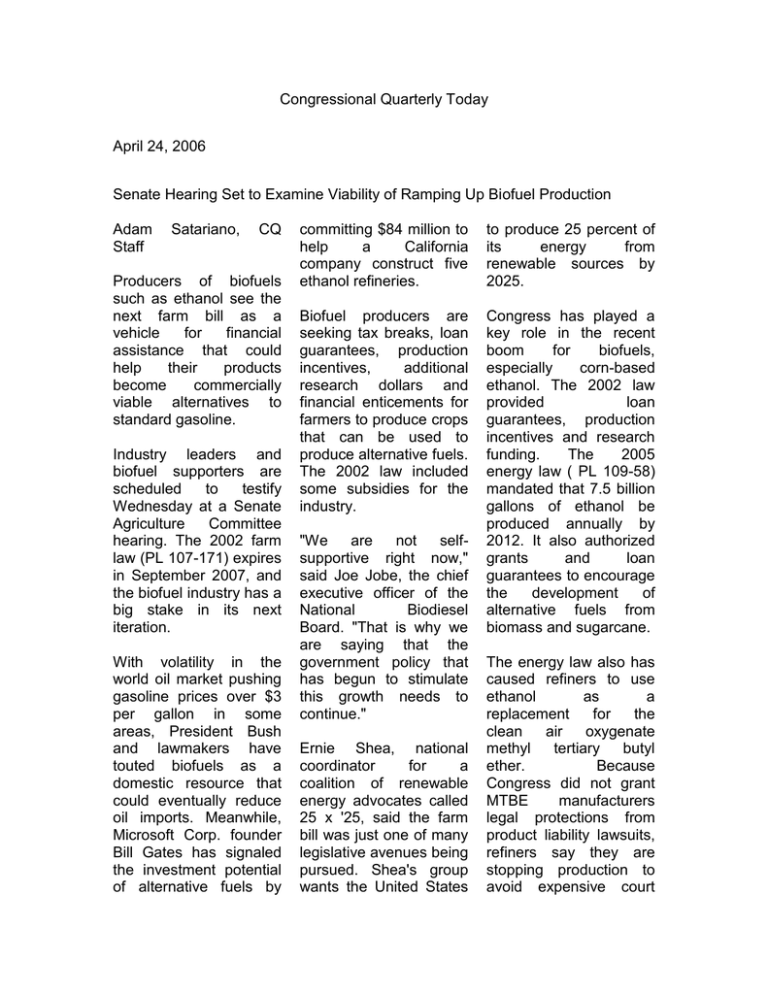
Congressional Quarterly Today
April 24, 2006
Senate Hearing Set to Examine Viability of Ramping Up Biofuel Production
Adam
Staff
Satariano,
CQ
Producers of biofuels
such as ethanol see the
next farm bill as a
vehicle
for
financial
assistance that could
help
their
products
become
commercially
viable alternatives to
standard gasoline.
Industry leaders and
biofuel supporters are
scheduled
to
testify
Wednesday at a Senate
Agriculture
Committee
hearing. The 2002 farm
law (PL 107-171) expires
in September 2007, and
the biofuel industry has a
big stake in its next
iteration.
With volatility in the
world oil market pushing
gasoline prices over $3
per gallon in some
areas, President Bush
and lawmakers have
touted biofuels as a
domestic resource that
could eventually reduce
oil imports. Meanwhile,
Microsoft Corp. founder
Bill Gates has signaled
the investment potential
of alternative fuels by
committing $84 million to
help
a
California
company construct five
ethanol refineries.
to produce 25 percent of
its
energy
from
renewable sources by
2025.
Biofuel producers are
seeking tax breaks, loan
guarantees, production
incentives,
additional
research dollars and
financial enticements for
farmers to produce crops
that can be used to
produce alternative fuels.
The 2002 law included
some subsidies for the
industry.
Congress has played a
key role in the recent
boom
for
biofuels,
especially
corn-based
ethanol. The 2002 law
provided
loan
guarantees, production
incentives and research
funding.
The
2005
energy law ( PL 109-58)
mandated that 7.5 billion
gallons of ethanol be
produced annually by
2012. It also authorized
grants
and
loan
guarantees to encourage
the
development
of
alternative fuels from
biomass and sugarcane.
"We
are
not
selfsupportive right now,"
said Joe Jobe, the chief
executive officer of the
National
Biodiesel
Board. "That is why we
are saying that the
government policy that
has begun to stimulate
this growth needs to
continue."
Ernie Shea, national
coordinator
for
a
coalition of renewable
energy advocates called
25 x '25, said the farm
bill was just one of many
legislative avenues being
pursued. Shea's group
wants the United States
The energy law also has
caused refiners to use
ethanol
as
a
replacement
for
the
clean
air
oxygenate
methyl
tertiary
butyl
ether.
Because
Congress did not grant
MTBE
manufacturers
legal protections from
product liability lawsuits,
refiners say they are
stopping production to
avoid expensive court
battles that have resulted
from
contaminated
groundwater supplies.
In recent weeks, the
ethanol industry has
come under fire from
refiners who say limited
ethanol supplies have
contributed to higher
gasoline prices. The
Energy
Information
Administration also has
cited ethanol constraints
but only as a minor
contributor
to
cost
increases at the pump.
Robert C. Brown of the
Center for Sustainable
Environmental
Technologies at Iowa
State University said
the government needs to
careful about "picking
winners" in developing
alternative fuels.
"A goal is not to turn corn
into
ethanol,"
said
Brown, who will testify
this week. "A more
appropriate goal is to
reduce our dependence
on imported petroleum.
Ethanol from corn is just
the starting point and it
will
eventually
be
superseded by other
[technologies]."
Brown
said
the
government should focus
on funding research into
new biofuels, such as
those that can come
from switchgrass or plant
fiber.
Manufacturers
of
biodiesel, now made
primarily from soybeans,
are looking to emulate
the success of cornbased ethanol. Jobe,
who also will testify at
the Senate hearing, said
biodiesel is still 10 years
behind
ethanol.
Government support in
the form of tax breaks
and
production
incentives have been
key to the increase in
biodiesel production, he
said, and will be needed
moving forward.
In 2004, biodiesel sales
were 25 million gallons.
In 2006, the industry is
projecting sales of 150
million gallons.
A version of this story
first appeared in CQ
Green Sheets.
Source:
CQ
Today
Round-the-clock
coverage of news from
Capitol
Hill.
©2006
Congressional Quarterly
Inc. All Rights Reserved.









